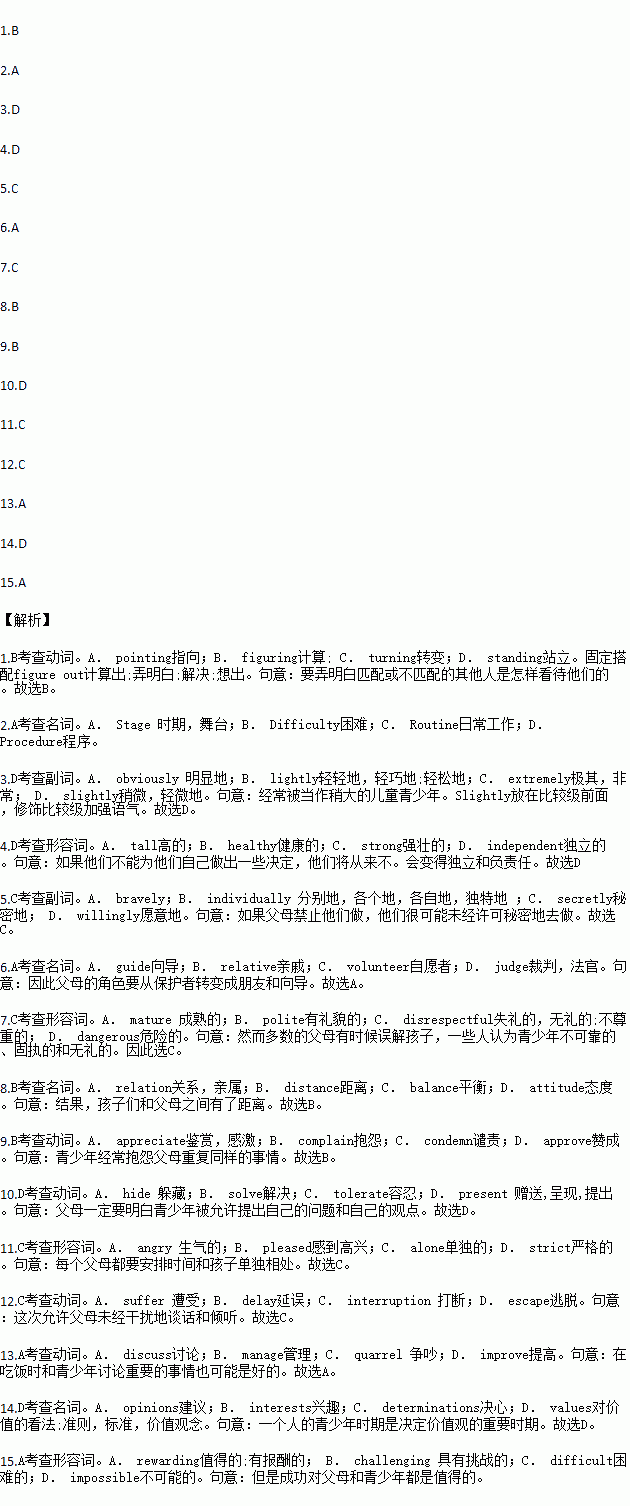题目内容
Teenage years can be confusing for both teenagers and parents.At about 15, many teens start thinking about how they feel about themselves and out how this matches or mismatches what others think of them.Most teens work through this by the age of 16 or 17.
Often teenagers are treated like bigger children, but they will never become and responsible if they are not allowed to make some decisions for themselves.If parents forbid their children from doing something, chances are that they will do it without permission anyway.The role of a parent must, therefore, change from that of protector and keeper to that of friend and .
Yet even the most caring parents misunderstand their children sometimes, and some think of teenagers as insecure, stubborn and .As a result, teenagers always keep their from their parents.Teens often that their parents repeat the same things over and over again and never listen to them.Parents must understand that teens need to be allowed to their side of any problem and express their point of view.
Thus, more private and level-headed communication is needed for the parents.Every parent should try to schedule time to be with their child, like taking a short trip together.This time allows parents to talk and listen without from work or other family members.It might also be good to encourage teens to important issues at dinner.Discussion time shows teens that parents are interested in them and their lives.
A person’s teenage years are a key time for them to identify their own ,like distinguishing good from evil.Handling and improving communication with teenagers is not easy, but success will be for parents and teens alike.
1.A.pointing B.figuring C.turning D.standing
2.A.Stage B.Difficulty C.Routine D.procedure
3.A.obviously B.lightly C.extremely D.slightly
4.A.tall B.healthy C.strong D.independent
5.A.Bravely B.individually C.secretly D.willingly
6.A.guide B.relative C.volunteer D.judge
7.A.mature B.polite C.disrespectful D.dangerous
8.A.relation B.distance C.balance D.attitude
9.A.appreciate B.complain C.condemn D.approve
10.A.hide B.solve C.tolerate D.present
11.A.angry B.pleased C.alone D.strict
12.A.suffer B.delay C.interruption D.escape
13.A.discuss B.manage C.quarrel D.improve
14.A.opinions B.interests C.determinations D.values
15.A.rewarding B.challenging C.difficult D.impossible
任务型阅读 (共 10 小题; 每小题 1 分, 满分 10 分)
Chronic disorganization occurs when one is habitually disorganized over a long period, which means the person is constantly unsystematic in how he conducts life and business. One suffering from this problem may find relief in the fact that it isn’t actually a disease or even an “official” disorder. It’s the continued lack of organization in one’s life.
Someone may become addicted to collecting a certain thing yet never organize the collection as it grows out of control. This can especially be a problem for those with a lot of time and money at hand, yet the problem can be serious for any type of person in a wide variety of situations.
One’s personal attitude can often be a big part of why the chronic disorganization exists. Once the attitude of acceptance about being a “slob” is in someone’s head, it’s hard to remove. If someone tells himself that he is a slob, he will likely live up to that self-image created by him or by those around him.
One first receives true awareness of the disorder of chronic disorganization when it starts to negatively affect relationships with friends and family members. Everybody becomes affected by this situation, especially those sharing living places with the one involved.
The National Study Group for Chronic Disorganization (HSGCD) recommends that one get help through a professional organizer. The study found that all of the subjects in the study had problems with making decisions. There were varied reasons given for this problem of decision-making. Among them were fears and prioritizing issues. Research is ongoing for the link between problems in decision-making and chronic disorganization.
Chronic disorganization often begins with situational disorganization, something most people experience at some point. Someone who has lost someone significant to him may start to be troubled by disorganization after a divorce. Someone who experienced changes in life and in his career may intend to let things like organization and order fall by the wayside. However, one doesn’t instantly have chronic disorganization.
“If you’re going through hell, keep going.” That’s an old saying that’s true about one’s struggles with chronic disorganization. Every person has the power to change within himself. It’s a matter of staying organized, one day at a time. Those who have left chronic disorganization in the past have often done so by promising to stay organized simply for that single day.
Definition | It means that the person has a(n) 1.__________ of being disorganized in life and business over a long period. |
2.________the problem | ●One example is that an addict3.___________ to organize the collection. ●The4._________ of chronic disorganization is partly affected by one’s personal attitude. ●One doesn’t realize the disorder of chronic disorganization until it has 5.____________ effects on the relationships with friends and family members. |
The6.___________ of the study | All subjects in the study suffer from the problem of poor decision-making, which is 7.____________ with chronic disorganization. |
Warning 8.____________ | Losing someone significant, 9._____________ a divorce or changes in one’s life and career. |
Good news | When in 10._______ with chronic disorganization, every person has the power to change, at least one single day at a time. |

